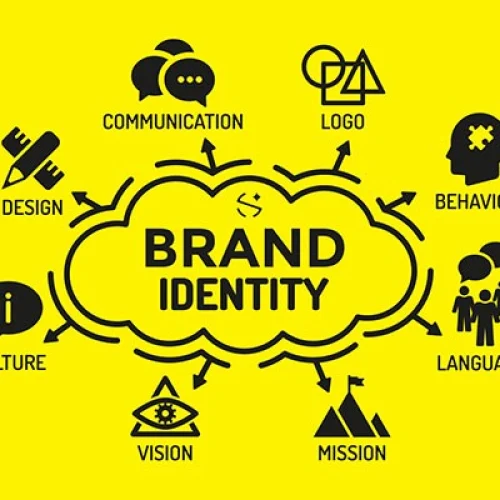Branding is the backbone of any successful startup. It goes beyond a logo or a name- it is the perception, trust, and emotional connection a company builds with its audience. In today’s highly competitive market, where thousands of startups launch every year, standing out is no longer optional. According to a Nielsen survey, 59% of consumers prefer to buy products from brands they recognize, highlighting the crucial role branding plays in customer decision-making.
For startups, branding is not just about looking good; it directly impacts credibility, customer acquisition, and long-term growth. A strong startup branding strategy ensures that customers understand what a business stands for, why it exists, and how it differentiates itself from the competition. Without a clear and memorable brand identity, even the most innovative tech startup branding or product can struggle to gain traction in the market.
Investors, too, consider branding an essential factor when evaluating startups. Research by CB Insights found that 42% of startups fail due to a lack of market need, but a weak brand positioning can also contribute to this failure. When a startup does not establish a strong identity, it becomes forgettable, making it harder to attract customers, retain them, or gain funding.
For businesses in the early stages, focusing on branding for startups helps set the foundation for sustained success. It is an investment that pays off by making a company more recognizable, credible, and trustworthy. Whether it is a D2C startup, SaaS platform, or B2B service provider, branding is what makes customers choose one company over another in a crowded marketplace.
One of the most common misconceptions in branding for startups is the confusion between branding and brand identity. While the two are interconnected, they serve distinct purposes in shaping how a startup is perceived. Understanding this difference is crucial for founders looking to establish a strong market presence.
Branding is the overall strategy that defines how a company presents itself to the world. It encompasses everything from the startup’s core values, messaging, and personality to the emotions it evokes in its audience. Branding is about shaping perceptions and creating a meaningful connection with customers. It answers fundamental questions like:

On the other hand, brand identity is the tangible representation of a brand. It includes the visual elements that make a startup recognizable, such as its logo, typography, color palette, packaging, and website design. A well-crafted brand identity helps reinforce a startup’s branding efforts by making the company instantly memorable and visually appealing.
For example, consider the branding strategies of successful tech startups like Airbnb, Slack, or Notion. Each of these companies has a strong brand identity- distinctive logos, consistent color schemes, and user-friendly interfaces. However, their success is not solely due to aesthetics. Their branding goes deeper, aligning their brand identity with their core mission and customer experience.
In the tech startup branding landscape, where innovation is constant, having a well-defined brand identity is not enough. Startups must actively build a brand that fosters trust and engagement. According to a Lucidpress study, maintaining brand consistency across all platforms can increase revenue by up to 33%. This means that from website design to social media presence, every touchpoint should align with the startup’s brand messaging and visual identity.
Ultimately, branding is the why behind a startup, while brand identity is the how it is visually expressed. Both elements must work together seamlessly to establish a strong and lasting presence in the market.

In the fast-paced world of startups, having a strong branding strategy for startups is not just a luxury- it’s a necessity. The competition is fierce, and customers today are more selective than ever. According to a Zendesk report, 81% of customers say that trust is a key factor in their purchasing decisions. Branding plays a direct role in building that trust and shaping how a startup is perceived in the market.
For many startups, especially in the tech industry, the focus is often on product development and scaling. While these are critical aspects, neglecting branding can be a costly mistake. A well-crafted startup branding strategy provides:
A new company entering the market needs to prove its legitimacy. Customers are more likely to engage with a brand that looks professional, communicates a clear mission, and delivers a consistent message. A startup with strong branding appears more reliable, making it easier to attract both customers and investors. Studies show that 46% of consumers are willing to pay more for brands they trust (Salsify).
Branding is what turns first-time buyers into repeat customers. Startups that invest in a strong brand design for startups create emotional connections with their audience, making customers more likely to return. According to Harvard Business Review, emotionally connected customers have a three times higher lifetime value compared to those who are merely satisfied.
With thousands of new startups launching every year, branding is often the only way to stand out. A startup that lacks a distinct brand voice or visual identity risks being forgotten. Effective branding for startups ensures that the company remains top-of-mind, helping it rise above competitors in an oversaturated market.
Branding influences how much customers are willing to pay for a product or service. Well-branded startups can charge premium prices because they are seen as more valuable. This is particularly important for tech startup branding, where perception plays a huge role in customer decision-making. For instance, Apple has built a brand synonymous with innovation and quality, allowing it to command higher prices than competitors with similar technology.

For startups looking to establish a strong market presence, branding is more than just a marketing tactic it’s a strategic asset that influences growth, customer acquisition, and long-term success. Whether you’re working on branding for startups, developing a brand identity for a tech startup, or positioning yourself in a competitive industry, certain fundamentals remain non-negotiable.
A startup’s brand story is its backbone. It’s what humanizes the company, making it relatable and memorable. According to Headstream, 55% of consumers are more likely to buy from a brand if they love its story. Take Airbnb, for example. Its brand story is not just about accommodation; it’s about belonging anywhere. This powerful emotional connection has helped the company grow into a global giant. Startups need to craft a brand story that resonates deeply with their target audience.
A well-defined brand design for startups includes the logo, color scheme, typography, and overall visual identity. Studies show that colors improve brand recognition by 80% (University of Loyola), and consistent branding across all platforms increases revenue by 23% (Forbes).
Every startup must ensure that its visual identity aligns with its brand values. A fintech startup, for instance, may opt for cool, professional tones like blue, while a direct-to-consumer (D2C) brand might use bold and playful colors to attract its audience.
A startup’s brand voice defines how it communicates with its audience. Whether it’s formal, conversational, witty, or authoritative, consistency is key. Tech startup branding, in particular, benefits from a unique tone- think Slack’s friendly yet professional communication or Tesla’s futuristic and disruptive messaging.
Brand voice consistency across all platforms- social media, website, emails, and customer support- ensures that customers instantly recognize and connect with the brand.
Startups must identify what sets them apart from competitors. This is where branding for startups plays a critical role. Without clear differentiation, a startup risks blending into the crowd. A great example is Notion, which positioned itself not just as a productivity tool but as an all-in-one workspace, making it a favorite among professionals and teams. Building a brand is not a one-time task- it’s an ongoing process that requires strategic investment, consistency, and adaptation. Founders who focus on these branding essentials from the start set their startups up for long-term success.
Branding for startups is a critical factor in establishing credibility, attracting customers, and driving long-term success. However, many startups make branding mistakes that weaken their identity and market position. Additionally, choosing the best branding companies for startups is crucial to crafting a compelling and differentiated brand. Below, we explore the most common branding pitfalls and how to select the right agency to build a strong foundation for your startup’s brand.
Many startups jump into branding without a defined strategy, focusing on visual elements without understanding their brand’s mission, values, or audience. A study by Lucidpress found that consistent branding across all platforms can increase revenue by 33%, but without a solid strategy, maintaining consistency is nearly impossible.
Solution: Develop a comprehensive brand strategy before designing your brand identity. Define your startup’s mission, unique value proposition, and target audience to create a meaningful connection.
Startups often struggle with maintaining consistency in their messaging, design, and tone across different platforms. A Forbes report found that businesses with consistent branding see an average revenue increase of 23%.
Solution: Establish clear brand guidelines, including logo usage, typography, colors, and messaging, and ensure they are followed across websites, social media, and marketing materials.
With thousands of new startups launching every year, failing to stand out can make your brand forgettable. Research by CB Insights found that 42% of startups fail due to a lack of market differentiation.
Solution: Identify your brand’s unique value proposition. What makes your startup different from competitors? Whether it’s pricing, innovation, customer service, or community engagement, highlight these differentiators in your branding.
Your brand identity is the first impression customers have of your business. A poorly designed logo, inconsistent color scheme, or cluttered visuals can make your brand look unprofessional. Studies show that color improves brand recognition by 80% (University of Loyola).
Solution: Invest in professional brand design for startups. A well-crafted visual identity should align with your brand values, be scalable, and resonate with your audience.
Some startups try to handle branding internally without expertise, leading to weak positioning and poor design execution. Founders may not have the time or knowledge to build a compelling brand identity, resulting in inconsistency and confusion.
Solution: Partnering with one of the best branding companies for startups can help develop a strong and cohesive brand presence. The right agency ensures your brand strategy, messaging, and visuals align with your business goals.
Branding is a long-term investment that can make or break a startup’s success. Avoiding common branding mistakes- such as inconsistency, lack of differentiation, and poor design- can set your startup up for growth. Additionally, choosing the best branding companies for startups ensures your brand strategy is well-executed, helping you stand out in a competitive market.
A strong startup branding approach builds credibility, fosters customer trust, and ultimately drives business success. Whether you’re a tech startup, D2C brand, or B2B service provider, investing in branding from the start can yield significant long-term benefits.
Branding helps startups establish credibility, differentiate from competitors, and build trust with customers. A strong brand identity improves customer recognition, loyalty, and perceived value, making it easier to attract funding and scale in a competitive market.
Branding is the overall strategy that shapes how a company is perceived, including its mission, values, and messaging. Brand identity, on the other hand, refers to the visual elements- such as logos, colors, and typography- that represent the brand and make it recognizable.